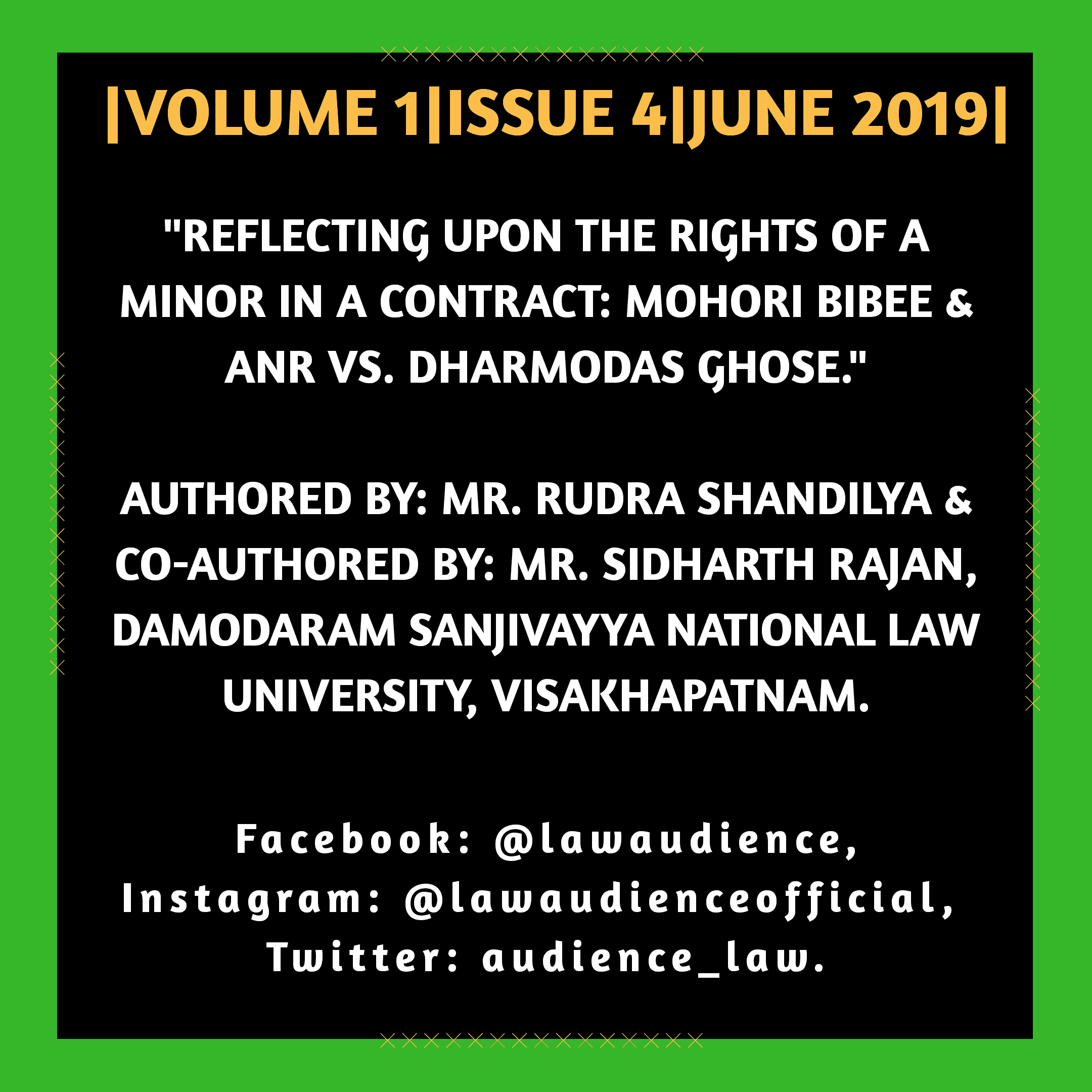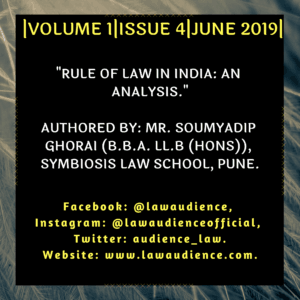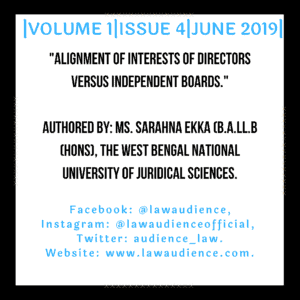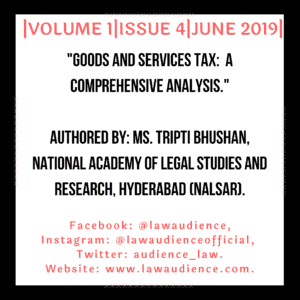Authored By: Mr. Rudra Shandilya (B.A.LL.B (Hons)), Co-Authored By: Mr. Sidharth Rajan (B.A.LL.B (Hons)), Damodaram Sanjivayya National Law University, Visakhapatnam.
CORAM
COURT NAME: PRIVY COUNCIL.
EQUIVALENT CITATIONS: (1903) 30 CAL. 539, 7 CWN 441, 30 M.I.A. 114.
APPELLANTS: MOHORI BIBEE & ANR.
RESPONDENT: DHARMODAS GHOSE.
SUBJECT: CONTRACT LAW.
BENCH: LORD MACNAUGHTEN, LORD DAVEY, LORD LINDLEY, SIR FORD NORTH, SIR A. SCOBLE AND SIR A. WILSON.
DATE OF JUDGEMENT: 04TH MARCH 1903.
I. INTRODUCTION:
“The case of Mohori Bibee & Anr vs. Dharmodas Ghose[1] has proved to be a landmark judgment as it was one of such cases that dealt with capacity of minor to enter into a contract and its different aspects. It is a case which reflects upon the rights of a minor in a contract. This case reflects that contract with a minor is void ab initio i.e. void since the beginning. In this landmark judgment, the Privy Council held that any type of contract with a minor is “absolutely and strictly void”. This judgment also made it clear that what the rights of a minor in a contract are. The Privy Council in this case also interpreted Section 10(3) and Section 11(4) of the Indian Contract Act, 1872. According to the opinion of courts, any person who has not attained the age of 18 years is incompetent to give free consent and hence, any type of contract with him is void and cannot be executed. This was made clear in the discussed case.”
II. FACTS OF THE CASE:
Dharmodas Ghose the respondent executed a mortgage in favour of Brahmo Dutt, who was a money lender having business at Calcutta as well as at other places, to secure the repayment of Rs. 20,000 at 12 per cent, interest on some houses, which were under a dispute belonging to the respondent. Moreover at the time of entering into contract respondent was a minor as he has not attended the age of 21 years. Throughout the transaction Brahmo Dutt was not present in Calcutta; hence the whole business was carried by his attorney Kedar Nath Mitter on behalf of him, and money by Dedraj who was a manager of Brahmo Dutt. While the transaction was in progress, Kedar Nath received a letter from the legal guardian of Dharmodas stating that Dharmodas is still a minor and any transaction with him will be at your own risk. The notice was ignored by Kedar Nath and entered into a contract with Dharmodas, though he knew that he was a minor. Later when the execution of contract took place, Dharmodas and his guardian denied acting upon the contract as it was with a minor hence it is void ab initio[2].
III. ISSUES INVOLVED:
- Whether Dharmodas can be estopped under section 115 of the Indian Evidence Act, 1872?
- Whether Brahmo Dutt can get the compensation under section 10 of the Indian Contract act, 1872?
- Whether the court can make Dharmodas liable under section 68 of the Indian Contract Act, 1872?
- Whether Dharmodas can be held liable to pay any restitution to Brahmo Dutt under section 64 and 68 of Indian Contract Act, 1872 and under section 38 of Specific Relief Act, 1877?
IV. PRINCIPLES:
According to facts of the case following sections had been applied as follows:
- Section 115 of Indian Evidence Act, 1872 states that, “Estoppel: – When one person has by his declaration, act or omission intentionally caused or permitted another person to believe a thing to be true, and to act upon such belief, neither he nor his representative shall be allowed in any suit or proceeding between himself and such person or his representative to deny the truth of that thing.”
- Section 19 of Indian Contract Act, 1872 states that, “When consent to an agreement is caused by coercion, fraud or misrepresentation, the agreement is a contract voidable at the option of the party whose consent was so caused. A party to the contract, whose consent was caused by fraud or misrepresentation, may, if he thinks fit, insist that the contract shall be performed, and that he shall be put in the position in which he would have been if the representations made had been true.”
- Section 2 of Indian Contract Act, 1872 states that, “(e) Every promise and every set of promises, forming the consideration for each other, is an agreement. (g) An agreement not enforceable by law is said to be void. (h) An agreement enforceable by law is a contract. (i) An agreement which is enforceable by law at the option of one or more of the parties thereto, but not at the option of the other or others, is a voidable contract.”
- Section 10 of the Indian Contract Act, 1872 states that, “All agreements are contracts if they are made by the free consent of parties competent to contract, for a lawful consideration, and with a lawful object, and are not hereby expressly declared to be void.”
- Section 11 of the Indian Contract Act, 1872 states that, “Every person is competent to contract who is of the age of majority according to the law to which he is subject, and who is of sound mind, and is not disqualified from contracting by any law to which “he is subject.”
- Section 68 of Indian Contract Act, 1872 section states that, “If a person incapable of entering into a contract or anyone whom he is legally bound to support is supplied by another person with necessaries suited to his condition in life, the person who has furnished such supplies is entitled to be reimbursed from the property of such incapable person.”
- Section 64 of Indian Contract Act, 1872 states that, “When a person at whose option a contract is voidable rescinds it, the other party thereto need not perform any promise therein contained in which he is promisor. The party rescinding a voidable contract shall, if he has received any benefit thereunder from another party to such contract, restore such benefit, so far as may be, to the person from whom it was received.”
- Section 65 of Indian Contract Act, 1872 states that, “When an agreement is discovered to be void, or when a contract becomes void, any person who has received any advantage under such agreement or contract is bound to restore, it, or to make compensation for it, to the person from whom he received it.”
- Section 38 (old section 41) of Specific Relief Act, 1877 states that, “On adjudging the rescission of a contract, the court may require the party to whom such relief is granted to make any compensation to the other which justice may require.[3]”
V. ARGUMENTS ADVANCED:
V.I ARGUMENTS OF APPELLANTS:
- That the respondent was a major and not a minor during his execution of the mortgage.
- That neither the appellant nor his agent was having any notice that the respondent was a minor.
- That the respondent had made a deceitful declaration regarding his age and is hence disentitled from seeking any relief.
- That the knowledge of the respondent’s actual age which Mr. Kedar Nath Mitter possessed should not be imputed to the appellants as Mr. Dedraj acted as the agent of Brahmo Dutt in this transaction.
- That the respondent is estopped from claiming that he was a minor at the time of executing the mortgage by section 115 of the Indian Evidence Act, 1872.
- That the respondent must repay the amount advanced according to Section 64 and 38 of the Indian Contract Act, 1872; and Section 41 of the Specific Relief Act, 1877.
- That the Indian Contract Act, 1872 has no provision to deal with the contract by minors[4].
V.II ARGUMENTS OF RESPONDENT:
- That Brahmo Dutt and his agents, Mr. Kedar Nath Mitter and Mr. Dedraj, possessed knowledge of the respondent’s actual age.
- That the respondent was a minor at the time of executing the mortgage and hence, the contract is void.
- That the Indian Contract Act, 1872 has provision to deal with the contract by minors.
- That the minor is not estopped from claiming that he was a minor by Section 115 of the Indian Evidence Act, 1872.
VI. JUDGMENT:
The case was before the Privy Council, wherein Brahmo Dutt came with a defence that Dharmodas was major when he entered into a contract and though even if he is minor, Kedar Nath had no knowledge of his infancy. Moreover, the undertaking as to his majority was also made misrepresented to deceive Kedar Nath. But the council ruled that it was very much evident from the evidences that Kedar Nath while doing his investigation for the mortgage, came to know that Dharmodas is a minor, moreover even the legal guardian of Dharmodas notified him before entering into contract, that Dharmodas is a minor and entering into contract will be at your own risk. But the receipt of same was denied by Kedar Nath, though the court ruled that Kedar Nath was under the knowledge of infancy and he had sufficient proofs to believe it. But because he denied the element of infancy and instead of that knowingly took an undertaking as to the majority of Dharmodas, hence it cannot be said that Kedar Nath was deceived. The transactions took place in the absence of Brahmo Dutt, hence Kedar Nath was acting on behalf of Brahmo Dutt, and hence the duty of care was upon him. Moreover, Kedar Nath had the knowledge regarding infancy of Dharmodas, as Kedar was acting as servant and Brahmo Dutt was his principle hence it was implied that Brahmo Dutt had the knowledge of infancy.
It was in the opinion of the Lordships that in the above case wherein a minor cannot be bind in a contract by any of the party to contract, under any of the section whether it be Section 115 of Indian Evidence Act, Section 64 & 68 of Indian Contract Act or Section 38 of Specific Relief Act, 1877.
Moreover, it was in the opinion of the court that Dharmodas cannot be bind under any of the above sections, hence the court held that Dharmodas was not liable for restitution to Brahmo Dutt. As Dharmodas was a minor and therefore it cannot be possible for him to pay 20,000, therefore looking the benefit of a minor court came to a decision that Dharmodas was not liable for making any restitution under any statute[5].
VII. ANALYSIS:
As from the facts of the case, Dharmodas entered into a contract with Brahmo Dutt, through his advocate Kedar Nath and it came to the knowledge of Kedar Nath that Dharmodas was a minor while he was doing his investigation. Moreover, the legal guardian of Dharmodas sent him a notification stating that Dharmodas is a minor and entering into a contract with minor will be at your own risk. In relation to it section 115 of the Indian Evidence Act, 1872 came to the issue. According to the section, when any person by his conduct makes another person to believe a thing to be true and act upon it, then he cannot deny the fact whether it is true or false. Though this section does not applies to minors, but looking at the above interpretation it can be inferred that Dharmodas cannot be held liable under the above section, because before entering into contract Kedar Nath came to know while he was doing investigation that Dharmodas is a minor and legal guardian of Dharmodas also notified him through a letter the Dharmodas is a minor. Hence, Kedar Nath was under the knowledge that Dharmodas was a minor though he ignored the fact and entered into a contract. Hence, Dharmodas cannot be held liable under section 115 of the Indian Evidence Act, 1872.
Moreover, section 19 of the Indian Contract Act, 1872 which states that any contract entered into because of any coercion, misrepresentation, undue influence etc. is voidable. But looking at the facts it is apparent that there was no misrepresentation, as the legal guardian of Dharmodas already notified Kedar Nath with notice regarding the minority of Dharmodas. Hence, while entering into contract Kedar Nath was already under the knowledge of the fact of the minority. Hence, Dharmodas cannot be held liable under section 19 of The Indian Contract Act, 1872.
As to the applicability of section 2 of the Indian Contract Act, 1872, sub-section (g), An agreement not enforceable by law is said to be void. (i) An agreement which is enforceable by law at the option of one or more of the parties thereto, but not at the option of the other or others, is a voidable contract. From the interpretation of the section, it is very much apparent that agreements in which any of the elements of section 2 are not fulfilled; in such condition the agreement becomes void. Whereas according to subsection 2(h), in the above conditions the contract was enforceable only on the part of Brahmo Dutt, but not from the side of Dharmodas. Hence, the agreement becomes a voidable contract.
As to section 10 of Indian Contract Act, 1872, all the agreements are contracts if are entered into with free consent, competency, lawful consideration, lawful object. In the above case the basic elements were not fulfilled as free consent of the parties was present, but competency was not there as Dharmodas was a minor, hence, it can be said that contract was entered into with incompetent person to contract. Therefore as one of the elements was not met hence agreement can be said to be void.
As to section 11 of the Indian Contract Act, 1872, all the person are competent to enter into a contract if have attended the age majority in accordance with the law to which he is subjected and should be of sound mind. And looking into the facts of the case it is very much apparent that Dharmodas was not competent to enter into a contract, as he has not attended the age of 21 years.
As to section 68 of the Indian Contract Act, 1872, the section states that any person who is incapable of entering into a contract, but any person who enters into a contract on his/her behalf has to reimburse the from such incapability. It is very much apparent from the facts that, the legal guardian did not enter into contract on behalf of Dharmodas but only notified Kedar Nath that Dharmodas is still a minor, hence, entering into the contract will be at your own risk. Hence as legal guardian nowhere entered into a contract on behalf of Dharmodas, hence, cannot be held liable for reimbursement of the loss.
As to section 64 of Indian Contract Act, 1872, the section states that when a contract becomes voidable for one party and rescinds it, under such circumstances if one party has incurred any profit from the contract, then it should be restored.
Section 2 of the Indian Contract Act, 1872 states that any agreement which is not enforceable by law is void. Section 10 of the Indian Contract, 1872 states that; to make an agreement contract as well as binding one of the condition is that; parties entering into a contract should be competent to enter into subject to the law. As in the above case, the court had appointed a legal guardian, hence according to the Wards Act, any person who has not attended the age of 21 years is a minor. Hence, as in the above case Dharmodas, while entering into contract was a minor, that is he has not attended the age of 21 years.[6] Hence, it can be inferred that there was only an agreement but not a contract. Hence, in a situation wherein there was no contract from the first instance, hence, there is no need to restitute Brahmo Dutt.
As to section 65 of Indian Contract Act, 1872, section states that an agreement or a contract which is discovered to be void, and if any of the party who has received any profit, in such condition one has to restore the profit to other parties.
According to section 10 of the Indian Contract Act, 1872, all the agreements wherein the parties entered into a contract, if are not competent to enter into a contract, then the agreement becomes void. According to the facts of the case, Dharmodas was a minor as he has not attended the age of 21 years and hence he was not competent to even enter into an agreement. Hence, when Dharmodas has not even entered into an agreement, Brahmo Dutt cannot ask for any restitution, because only when an agreement becomes enforceable by law and out of that any party to it gets any profit has to restore it to other parties. Hence, Dharmodas also cannot be held liable under the above section.
As to section 38 (old section 41) of Specific Relief Act, 1877, states that, a court may ask the party to contract to whom any relief is granted by the court, also to make some compensation to the other party. According to the elements of section 10, when anyone of the elements is not fulfilled, in such circumstances the agreement becomes void. And according to the facts of the above case, the contract never came into existence between both the parties as the agreement was not in accordance with the elements of section 10 in relation to competency to enter into a contract. Hence, when there is no contract, though if a court may grant relief to Dharmodas, it cannot impose upon him to compensate for the profits.
According to the authors, any type of contract with a minor should be void ab initio and hence, the court is correct in its holding. The discussed case created some controversy as the chances of fraud by minors increased thereafter. Minors could not give free consent in their right mind and if they do so then also it is not the same as that of an ordinary person. Any agreement that can be enforced by Law is a contract and a contract is void if there is no free consent and therefore, in the case of a minor, the consent can be dominated by the majors due to which, a contract cannot be performed and hence, any type of contract with a minor should be void and the court judgment is correct despite of it being controversial.
VIII. CONCLUSION:
In the present world, the need of human keeps on increasing. In order to satisfy those needs, we may have to enter into a contract. But as to whether all those contracts are legally binding or not is a matter of fact. There are many laws in relation to whether a contract by a minor is void or voidable. In the present legal system when we have so many laws, we also have different types of interpretation to understand laws. A minor is one who is below the age of 18 or 21 years depending upon different Legislations and interpretations. A person who enters into a contract has to understand the consequences of the act, but a minor may not able to foresee the consequences of such acts.[7] Hence, the duty lies upon the Judiciary to protect the interest of a minor as well as to protect from any such legal consequences. In the landmark case of Mohori Bibee & Anr vs. Dharmodas[8], Judiciary has played a very vital role in protecting Dharmodas, a minor from the legal consequences of the contract. Looking into the case, it is very much apparent that a minor cannot enter into a contract and if s/he enters in such case not even the Judiciary but even the Legal system protects a minor. In the above case wherein, many sections were applied to bind a minor in the contract, but from the interpretation of the laws, it was inferred that even law wants to protect a minor from the consequences of entering into a contract.
The case has proved to be a very landmark because it has been one of such kind wherein many sections of different statutes have been applied and interpreted in a different way. The only aim of the law is to protect a minor also the burden lies upon Judiciary to protect him from society as well as consequences of an act, which a minor cannot understand.[9]
[1](1903) 30 Cal. 539 (India).
[2] Ibid.
[3] Ibid.
[4] Ibid.
[5] Ibid.
[6]US Legal, Inc, Contract by a MinorContracts, https://contracts.uslegal.com/contract-by-a-minor/ (last visited May 11, 2019).
[7] Sylvine, Minor’s Capacity To Enter Into A Contract iPleaders(2019), https://blog.ipleaders.in/minors-capacity-enter-contract/ (last visited May 10, 2019).
[8] supra note 1.
[9]Child Rights in India | Right To Education And Health – Smile Foundation, https://www.smilefoundationindia.org/child_rights.html (last visited May 10, 2019).



